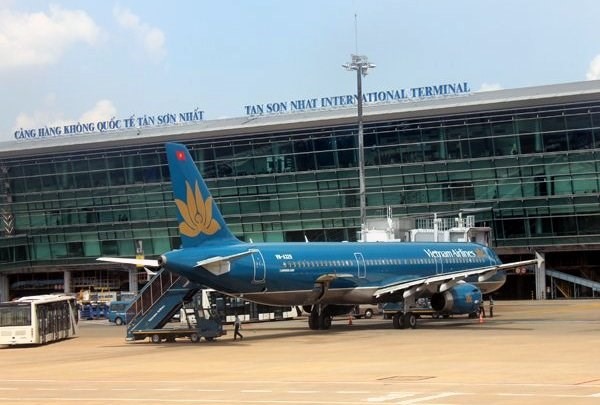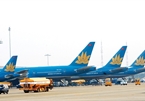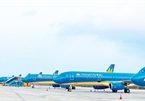 |
|
Tan Son Nhat International Airport in HCM City. Photo courtesy of the Airports Corporation of Vietnam
|
The Minister of Transport has approved Circular 19, which regulates the fees of takeoff and landing and aircraft operating services for domestic flights, including specialised aviation services, at airports across Viet Nam, for the next six months, from October through March.
The fees for airline service fees such as aircraft takeoff and landing service and other flight operation services have already been reduced by 50 per cent since the beginning of March, under a Government resolution on supporting enterprises affected by the pandemic.
The Airports Corporation of Viet Nam (ACV) had reduced airline service fees from March through August to support airlines suffering from the impact of the outbreak.
ACV reduced fees for a range of airline services at airports, including service fees for aircraft navigation (cut by 50 per cent); and pipe ladder services, carousel rentals, automatic baggage handling, check-in counters and ground services (by 10 per cent).
In addition, ACV, which operates more than 20 airports across the country, waived office rental fees for airlines that have stopped flying, and reduced fees by 30 per cent for airlines that are still operating flights.
ACV has also waived fees for some specialised aviation services.
Earlier this year when the pandemic broke out, the Ministry of Transport asked the Ministry of Planning and Investment to consult with the Prime Minister about the proposed reduction.
The Ministry of Transport also asked the Government to assign the Ministry of Finance to oversee exemptions of import tax and environmental protection tax on aircraft fuel from March to August.
The pandemic has severely affected revenues of Vietnam Airlines and ACV.
Vietnam Airlines reported VNĐ6 trillion ($257.1 million) in second-quarter revenue, down nearly 70 per cent from the previous quarter, as a result of a month-long social distancing order in April and the ongoing suspension of international flights.
The national flag carrier suffered quarterly losses of VNĐ4.03 trillion, raising the total loss in the first half of the year to more than VNĐ6.64 trillion.
In mid-July, it estimated that losses would reach VNĐ13 trillion this year.
Meanwhile, ACV recorded post-tax losses of over VNĐ365 billion in the second quarter as its revenues plunged VNĐ76.6 per cent from the same period last year to over VNĐ1.04 trillion.
The airport operator projected that the number of air passengers would fall by 41 per cent year-on-year to 69.2 million this year, while the volume of cargo going through 21 airports across the country would fall by 13 per cent to 1.34 million tonnes.
Airlines around the world are expected to lose $84 billion as the pandemic has cut revenue by half to mark the worst year in the aviation industry’s history, according to a forecast of the International Air Transport Association made in June. — VNS

Aviation traditions crumble as airlines take on new restructuring approaches
It is undeniable that the aviation industry has contributed greatly to the development of the global economy, accounting for roughly 3.6 per cent of total global GDP.

Rays of sunshine in aviation clouds
Amid serious impacts of COVID-19, there are hopeful points for the aviation sector on the back of the EU-Vietnam Free Trade Agreement.